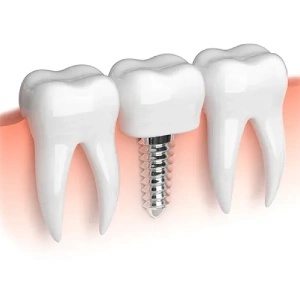When restoring your smile with dental implants, success depends on more than just the visible crown; it starts with your gum health.
Gum health and dental implants go hand in hand. Healthy gums protect the bone, prevent infection, and keep your implants stable for years. Without proper gum care, even advanced implants can fail early.
That’s why periodontal treatments are essential. Treating gum disease and strengthening the soft tissues before implant placement creates a strong, lasting foundation for your new smile.
Why Gum Health Matters for Dental Implants
Healthy gums are crucial for the success and longevity of your dental implants. They act as the foundation that supports both the implant fixture and the surrounding bone, ensuring stability and preventing infections. Even the best implants may not last as long as expected without healthy gums.
Barrier Against Bacteria
Your gums create a protective seal around the implant, blocking bacteria from causing infection. If the gum tissue becomes inflamed or compromised, it can lead to peri-implant infection and other complications.
Support and Distribution of Forces
Healthy gums distribute chewing pressure evenly across the implant, helping maintain stability. This reduces stress on the implant-bone interface, ensuring long-term success.
Aesthetic and Tissue Stability
Well-maintained gums prevent recession, preserving the natural curve of your gumline. This keeps your implants looking natural and seamlessly integrated with your real teeth.
Longevity and Implant Survival
Untreated gum disease increases the risk of implant failure. Healthy gums ensure the implant properly integrates with the bone and remains stable for years.
Prevention of Bone Loss
Healthy gums help maintain the bone around your implant. Gum disease can lead to bone resorption, weakening the foundation that holds the implant in place. Keeping your gums healthy helps preserve the bone, ensuring your implant remains secure and stable for the long term.
How Periodontal Disease Threatens Implant Success
Periodontal disease can significantly impact the stability and longevity of dental implants. Here’s how gum disease affects your implants and why maintaining gum health is essential.
Gingivitis and Periodontitis Progression
It all starts with plaque — a sticky film of bacteria that forms when oral hygiene is neglected. This plaque irritates the gums, leading to gingivitis, the first stage of gum disease. While gingivitis is reversible with proper care, if left untreated, it progresses to periodontitis, where bacteria destroy the bone and tissue that support your implants, putting them at serious risk.
Once bone loss occurs, the foundation for your implant weakens, making it harder for the implant to integrate properly with the bone. This increases the risk of implant failure or instability.
Peri-Implantitis — Gum Disease Around Implants
Even after implants are placed, gum inflammation can still occur. When bacteria accumulate around the implant, it causes peri-implant mucositis, a mild inflammation of the soft tissue. If untreated, it can escalate to peri-implantitis, a more serious condition that affects both soft tissue and bone. This can lead to:
Bleeding and swelling around the implant
Bone loss visible on X-rays
Implant discomfort or mobility
Regular dental check-ups are crucial to detect these issues early and prevent long-term damage.
Bone Resorption and Implant Instability
Gum disease accelerates bone resorption, the gradual loss of bone mass around the implant site. Without sufficient bone support, implants can shift, loosen, or fail. Bone regeneration procedures may be needed to restore bone and maintain implant stability.
Learn more about the connection between oral health and your body in our blog on How can poor oral health affect the rest of the body?
Increased Risks of Implant Failure Due to Gum Disease
Placing implants in a mouth with active gum disease increases the likelihood of several complications, including:
- Incomplete osseointegration (failure of the implant to fuse with bone)
- Infection and delayed healing
- Gum recession and tissue breakdown
- Chronic inflammation, leading to discomfort or implant failure
- Peri-implantitis (infection around the implant, causing bone loss and soft tissue damage)
- Implant mobility, where the implant becomes loose or unstable
- Pain and discomfort that persists longer than expected
- Bone resorption (gradual loss of bone around the implant, weakening the foundation)
- Aesthetic issues, such as visible implant threads or gum gaps between the implant and natural teeth
- Increased need for corrective surgeries or implant removal
- Failure to properly heal from surgery due to compromised tissue or infection
Maintaining gum health before, during, and after implant surgery is crucial to minimizing these risks and ensuring your implants last for years.
Essential Periodontal Treatments Before Implant Placement
Before placing dental implants, your dentist or periodontist must ensure your gums and bone are healthy and disease-free. This step is crucial to creating a clean, strong environment where implants can properly integrate.
1. Comprehensive Gum Evaluation
Your implant journey begins with a thorough gum assessment. During this evaluation, your dentist measures pocket depths, checks for bleeding, and examines bone levels with digital X-rays or CBCT scans. This diagnostic phase helps determine whether gum therapy or bone augmentation is needed before proceeding.
2. Scaling and Root Planing (Deep Cleaning)
This non-surgical treatment is often the first step in restoring gum health. It removes hardened plaque (tartar) and bacteria from below the gum line and smooths root surfaces so that the gums can heal and reattach naturally.
3. Periodontal Surgery or Pocket Reduction
If deep pockets remain after non-surgical treatment, flap surgery may be recommended. The gums are gently lifted to access and clean the infected areas, then repositioned to reduce pocket depth. This allows easier home care and less bacterial buildup in the future.
If you have concerns about periodontal pockets, it’s important to address them before implant placement. Learn more about how to treat periodontal pockets and why they matter for implants in our detailed guide on What should I do about my periodontal pockets?
4. Soft Tissue Grafting
When gums have receded or thinned, soft tissue grafts help strengthen and reshape them. This not only improves gum protection but also enhances aesthetics, ensuring your implant looks natural once placed.
5. Bone Grafting and Guided Tissue Regeneration
If gum disease has caused bone loss, your dentist may perform a bone graft or guided tissue regeneration. These regenerative treatments rebuild lost bone and soft tissue, providing the support implants need to fuse properly with the jaw.
6. Healing and Re-Evaluation
After these treatments, a healing period allows tissues to recover fully. Your periodontist will then re-evaluate gum and bone health before scheduling implant placement, ensuring optimal conditions for long-term success.
Post-Implant Gum Care: Maintenance and Prevention
Getting dental implants placed is just the start. To keep them healthy for life, ongoing care, professional cleanings, and good habits are essential. Here’s how to ensure long-term success:
- Brush and Clean Regularly: Brush twice daily with a soft toothbrush and clean around the implant using implant-safe floss or interdental brushes.
- Use a Water Flosser and Antimicrobial Mouthwash: Consider a water flosser for gentle rinsing and use an antimicrobial mouthwash as recommended to control bacteria.
- Attend Periodontal Maintenance Visits: Professional cleanings every 3–4 months are essential for preventing issues like peri-implantitis and maintaining gum health.
- Maintain Healthy Habits: Avoid smoking, manage diabetes, and keep a balanced diet rich in vitamins to support your gums and bone health.
- Monitor for Issues: Watch for early signs like swelling or discomfort around the implant. Early detection can prevent complications.
Early Warning Signs of Implant Issues You Shouldn’t Ignore
If you notice any of the following signs, it’s important to contact your dentist as soon as possible:
- Bleeding, redness, or swelling around the implant site
- Gum recession or visible implant threads
- Pain or discomfort, or if the implant feels loose or shifts
- Persistent bad taste or unpleasant odor near the implant area
- Increased sensitivity around the implant or surrounding teeth
- Difficulty chewing or discomfort when biting down
- Pus or drainage from the implant site
- Inflammation or tenderness in the gums around the implant
- Changes in the fit or appearance of the implant crown
Catching these issues early allows for treatment, preventing minor problems from becoming serious complications. By addressing concerns quickly, you can help protect your gum health and the long-term success of your implants.
Conclusion
A dental implant is only as strong as the gum health supporting it. For long-term success, the journey must begin with healthy gums and be supported by ongoing periodontal care. By prioritizing gum health and understanding why periodontal treatments are crucial, implant candidates can significantly improve their chances of lasting success, reduce complications, and achieve optimal function and aesthetics.
Your implant is not just a standalone procedure — it’s part of a comprehensive treatment plan that starts with ensuring the health of your gums.
Secure Your Smile with Healthy Gums
Don’t wait, ensure the success of your implants by addressing gum health today. Take the first step toward a beautiful, long-lasting smile with a foundation of healthy gums. Schedule your personalized consultation at Centers for Dental Implants to learn how we can ensure the success of your implants.
We are ready to assist you with locations in Aventura, FL, Hallandale Beach, FL, and Pembroke Pines, FL.
FAQs
Can I still get implants if I have gum disease?
Yes, you can get dental implants only after treating the gum disease and stabilizing the tissues. Implants placed into infected or inflamed gums have a higher risk of failure. It’s essential to address the gum disease first to ensure a successful implant procedure.
How long after periodontal therapy can implants be placed?
The timeline depends on the severity of the gum disease and the healing process. For mild cases, implants may be placed within weeks, while more advanced cases often require months of healing and stabilization before implant placement.
Does periodontal therapy add extra cost or delay my implant procedure?
Yes, periodontal therapy adds both time and cost. However, it is more cost-effective in the long run compared to the higher costs associated with implant failure or the need for retreatment later.
Is implant maintenance different from regular gum cleanings?
Yes, implant maintenance is more intensive than routine cleanings. It involves deeper cleaning with specialized instruments designed for implants and focuses on monitoring tissue health to prevent complications like peri-implantitis.
What if gum disease develops after implant placement?
Gum disease can develop around implants, known as peri-implant disease. If caught early as peri-implant mucositis, it can often be reversed. However, if it progresses to peri-implantitis, more aggressive treatment may be needed, including the possibility of implant removal.

